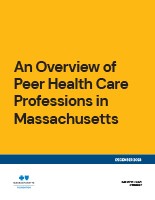

An Overview of Peer Health Care Professions in Massachusetts
Peer supports are an important component of the health care system in Massachusetts. Peers provide a vital bridge to services by offering empathy, information, encouragement, and navigational assistance to people who face linguistic and cultural access barriers, stigma, absence of a support network, and other challenges. Peers are part of the communities they serve and often share lived experiences with the individuals they work with, making them uniquely qualified to foster trust in the health care system where it might be lacking. The nature of peers’ work is often well known in their own professional and programmatic circles, but understanding of their role is less clear across the broader health care system. This brief provides an overview of the primary professions that comprise the peer workforce in Massachusetts, where they work, and the various approaches to training, certification, and payment of these providers.
